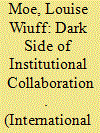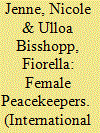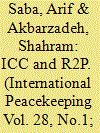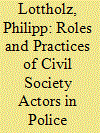|
|
|
Sort Order |
|
|
|
Items / Page
|
|
|
|
|
|
|
| Srl | Item |
| 1 |
ID:
177847


|
|
|
|
|
| Summary/Abstract |
United Nations (UN) peacekeeping operations are among the most effective tools available for the international community to deal with threats to international peace and security. However, such operations have also been presenting significant shortcomings, like below average performances of some peacekeeping units. Against this backdrop, this article discusses the complexities of robust peacekeeping and the problem of military underperformance, intending to ascertain the significance of combat motivation as a contributing factor to the efficiency of UN military components and the effectiveness of robust peacekeeping missions. The results indicate the relevance of combat motivation for UN troops’ better performances. Also, the findings point out the need to enhancing affective aspects in the preparation of the blue helmets, like self-confidence, small units cohesion, leadership, and sense of the cause.
|
|
|
|
|
|
|
|
|
|
|
|
|
|
|
|
| 2 |
ID:
177846


|
|
|
|
|
| Summary/Abstract |
Within the field of international peace and security, policy makers and analysts alike commonly treat collaboration and convergence among international organizations and intervention frameworks as a policy objective in itself. Indeed, from the focus on the ‘comprehensive approach’, during the 2000s, to the recent emphasis on multi-dimensional and integrated stabilization frameworks, institutional collaboration is cast as inherently positive and desirable in regard to addressing international collective matters. This article challenges such ‘collaboration bias’. It does so by exploring the empirical effects of increasing collaboration and ‘strategic partnerships’ within the context of the current (re)turn to stabilization interventions. Specifically, focusing on Mali, it unpacks how contemporary stabilization efforts intensify collaboration across counterterrorism and peacekeeping interventions in ways that undercut policy implementation within one of the most central peacekeeping priority areas, namely the Protection of Civilians (PoC). In detailing key aspects on which contemporary peacekeeping-counterterrorism entanglements compromise protection efforts, the article conveys some of the ‘dark sides’ of cooperation regimes. It moreover highlights the need to not only explore regime complexity as a systemic feature of world politics but also unpack how it operates, and to what effect, at the meso and micro levels of policy implementation and practice.
|
|
|
|
|
|
|
|
|
|
|
|
|
|
|
|
| 3 |
ID:
177852


|
|
|
|
|
| Summary/Abstract |
In 2000, the United Nations Security Council Resolution 1325 on Women, Peace and Security recognized an urgent need to mainstream a gender perspective into peacekeeping operations in order to achieve gender equality. UN member states have been called upon to implement the Resolution through National Action Plans. Almost two decades after its adoption, research indicates that progress towards the goals set in Resolution 1325 has been slow. This article builds on the case of the Chilean military to assess whether and to what extent a gender perspective has been incorporated into the country’s peacekeeping practice. We argue that gender stereotypes have persisted despite Chile’s status as a regional pioneer in promoting gender equality in its defence policy. Paradoxically, the new opportunities peacekeeping offered for women in the military have been legitimized by a discourse that conforms to traditional gender stereotypes, such that women serve as the ‘peaceful and friendly face’ in peacekeeping.
|
|
|
|
|
|
|
|
|
|
|
|
|
|
|
|
| 4 |
ID:
177850


|
|
|
|
|
| Summary/Abstract |
The ICC and R2P share the goal of ending atrocity crimes. Nonetheless, they operate quite differently. Recently, there has been increasing support for bringing the ICC within the R2P toolkits, hoping they will complement each other to achieve their shared goal. The Security Council put this idea into practice to deal with the 2011 crisis in Libya. However, the invocation of ICC against the backdrop of an evolving military intervention under the R2P mandate highlighted significant risks to its integrity and legitimacy. This paper argues that the invocation of ICC to constrain violence and to hold accountable the Libyan regime for atrocity crimes eventually resulted in legitimizing military intervention and regime change under the R2P mandate. The Libya case suggests that neither the push for complementarity nor a full separation between the ICC and R2P benefits the ICC. There needs to be a balance between full engagement and separation. Such an alternative rests on the ICC avoiding entanglement with R2P’s military mandate, while maintaining close interaction with its non-military components through the Security Council. Lastly, the paper also points to areas in which the Council could play a more constructive role in cementing greater cooperation between R2P and the ICC.
|
|
|
|
|
|
|
|
|
|
|
|
|
|
|
|
| 5 |
ID:
177851


|
|
|
|
|
| Summary/Abstract |
On the basis of 12 months of field research conducted in nine cities in Côte d’Ivoire, this study explores the relationship between demobilization, disarmament and reintegration (DDR) and transitional justice. It finds that suggestions that the two should be totally isolated from one another are both extremely difficult and undesirable in a post-conflict setting where DDR and transitional justice interact frequently and could, in theory, have many positive ramifications for one another. However, contrasting propositions that far-reaching coordination should occur between DDR and transitional justice are not without difficulty. Bringing the two initiatives together is often challenging, particularly at a national level where the political will of post-war governments can be lacking and populations resistant to more comprehensive peacebuilding programmes. Instead, the article proposes, a third, more moderate approach to coordination. It suggests that a bare minimum level of cooperation should be considered a benchmark, ensuring that DDR and transitional justice practitioners are always aware of what is occurring in the other domain. Beyond this, greater cooperation may not be possible, but where it is, it is most likely to be achieved successfully at a local level, between social reintegration and personal reconciliation
|
|
|
|
|
|
|
|
|
|
|
|
|
|
|
|
| 6 |
ID:
177848


|
|
|
|
|
| Summary/Abstract |
The increasingly complex and differentiated field of security sector and police reform has given rise to extensive research into such processes, but also the stalemate and contradictions they are facing. Recent analyses have shown how civil society actors can successfully influence reform and hold authorities accountable, but are also facing limits in terms of their own expertise, capacity and representativeness. This article presents new evidence of interactions between civil society, state authorities and international organizations on the basis of participatory fieldwork and public discourse analysis in the Kyrgyz Republic in Central Asia. Taking particular interest in practices, expertise and knowledge production, I show how the organization in focus, an NGO network promoting alternative approaches to police reform, had to live up to different roles in trying to effect change: that of activists who mobilize popular support; of experts who apply novel, participatory community security approaches in piloting communities; and lastly, that of knowledge producers providing evidence of the need for reform. These roles and practices, and their implications for the network’s reform impact are critically assessed and, in conclusion, developed into the need for future research.
|
|
|
|
|
|
|
|
|
|
|
|
|
|
|
|
|
|
|
|
|